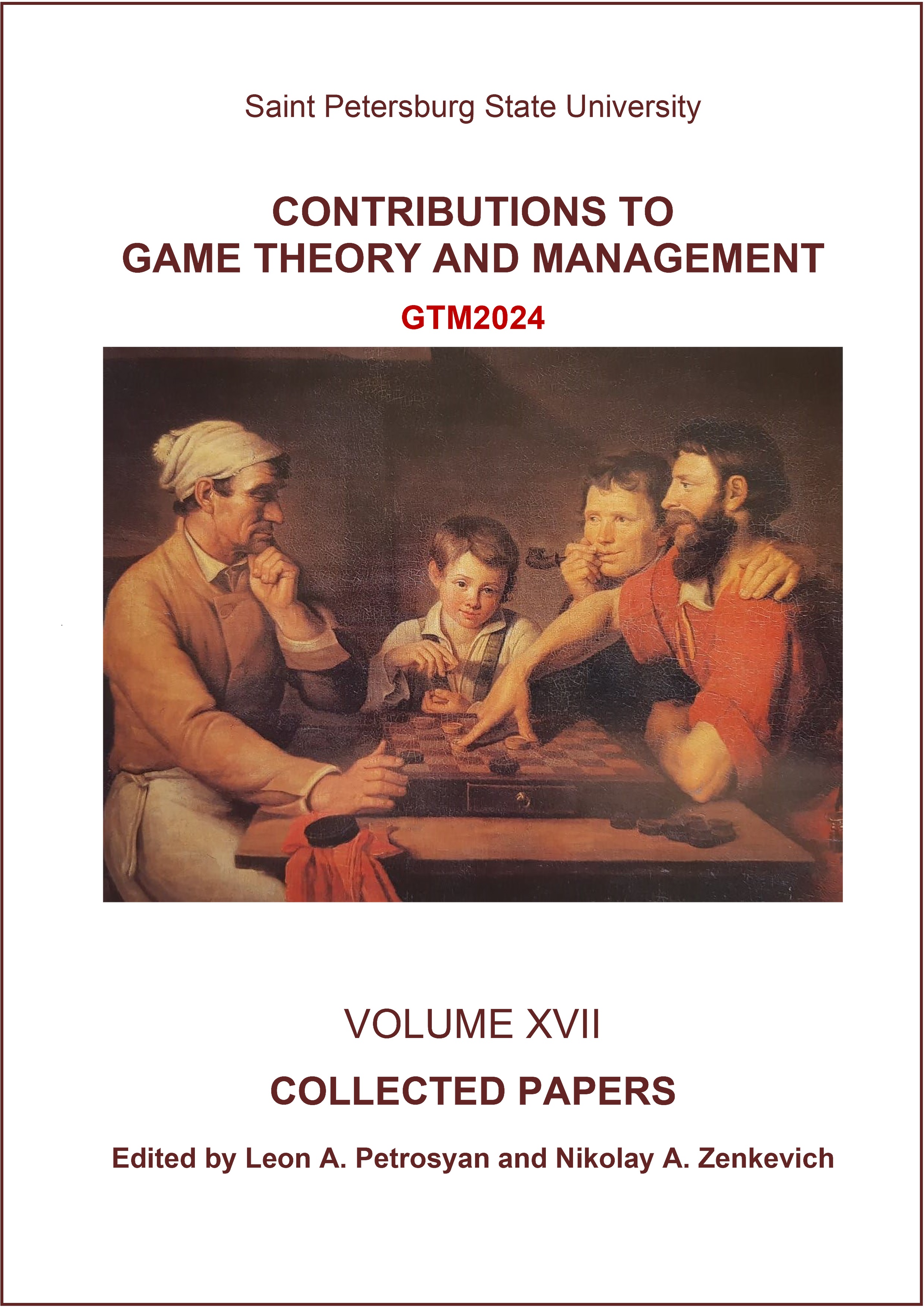A Differential Investment Game with Unknown Utility Switching Moment
Abstract
This article presents an approach to estimate the switching moment of utility functions in non-cooperative differential games, which serves as a crucial determinant in strategic decision-making under uncertainty. Grounded on the previously established models for cooperative scenarios, this study extends the estimation methodology to non-cooperative scenarios where individual players pursue independent objectives. By formulating a minimax problem, we derive optimal estimates for the switching moment, allowing each player to maximize their individual payoff under conditions of incomplete information. An example of an investment problem illustrates the application of the model, highlighting the contrasts in optimal estimate of switching moment between non-cooperative and cooperative frameworks. Comparative analysis further demonstrates that there are significant differences between the non-cooperative and cooperative frameworks in terms of optimal estimates, strategy stability and adaptability to uncertainty.
Keywords:
Non-cooperative differential games, Switching moment estimation, Pontryagin’s Maximum Principle, Comparative analysis
Downloads
References
Basar, T., Zaccour, G. (2018). Handbook of dynamic game theory. Springer.
Chebotareva, A., Su, S., Tretyakova, S., Gromova, E. (2021). On the value of the preexisting knowledge in an optimal control of pollution emissions. Contributions to Game Theory and Management, 14, 49–58.
de Zeeuw, A., He, X. (2017). Managing a renewable resource facing the risk of a regime shift in the ecological system. Resource and Energy Economics, 48, 42–54.
Friedman, J. W. (1986). Game theory with applications to economics. Oxford University Press, Cambridge, Massachusetts and London, England.
Gromov, D., Gromova, E. (2014). Differential games with random duration: a hybrid systems formulation. Contributions to Game Theory and Management, 7, 104–119.
Gromova, E., Malakhova, A., Palestini, A. (2018). Payoff distribution in a multi-company extraction game with uncertain duration. Mathematics, 6(9), 165.
Lade, S. J., Tavoni, A., Levin, S. A., Schlüter, M. (2013). Regime shifts in a social-ecological system. Theoretical Ecology, 6, 359–372.
Masoudi, N., Santugini, M., Zaccour, G. (2016). A dynamic game of emissions pollution with uncertainty and learning. Environmental and Resource Economics, 64, 349–372.
Petrosjan, L. A., Shevkoplyas, E. V. (2003). Cooperative solution for games with random duration. Game Theory and Applications, 9, 125–139.
Shevkoplyas, E. V. (2014). The Hamilton-Jacobi-Bellman equation for a class of differential games with random duration. Automation and Remote Control, 75, 959–970.
Shevkoplyas, E., Kostyunin, S. (2011). Modeling of environmental projects under condition of a random time horizon. Contributions to Game Theory and Management, 4, 447–459.
Su, S., Tur, A. (2022). Estimation of initial stock in pollution control problem. Mathematics, 10(19), 3457.
Tur, A., Gromova, E., Gromov, D. (2021). On the estimation of the initial stock in the problem of resource extraction. Mathematics, 9(23), 3099.
Wu, Y., Tur, A., Wang, H. (2023). Sustainable optimal control for switched pollution-control problem with random duration. Entropy, 25(10), p. 1426.
Ye, P., Tur, A., Wu, Y. (2024). On the estimation of the switching moment of utility functions in cooperative differential games. Kybernetes. https://doi.org/10.1108/K-05-2024-1241
Zaremba, A. P. (2022). Cooperative differential games with the utility function switched at a random time moment. Automation and Remote Control, 83(10), 1652–1664.
Downloads
Published
How to Cite
Issue
Section
License
Articles of "Contributions to Game Theory and Management" are open access distributed under the terms of the License Agreement with Saint Petersburg State University, which permits to the authors unrestricted distribution and self-archiving free of charge.




